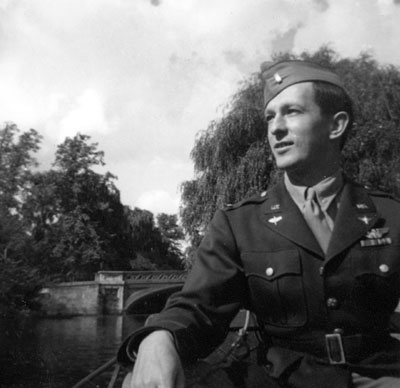OFF-BASE RECREATIONS
Near Debach
Bicycles, given us to get around the base, also served us to cruise the countryside near Debach in our free hours. On a fine day we might just walk out the gate and stroll along a lane through the farmlands. Because of stringent gas rationing, few cars travelled the back roads. Away from bases, except for the drone of airplanes passing overhead, East Anglia was quiet country. Frank Littleton once cajoled me into joining him on a horseback tour. He arranged for the rental of our horses from a woman who managed a nearby farm. She accompanied us as we clopped through Woodbridge and out along narrow roads confined by stone walls and high, dense hedges. My steed was named Peter. He ambled at his own unsteady pace, oblivious of my uncertain proddings. When the notion came to him, which was often, he stopped and sampled roadside grasses despite my argument that we should keep up with the others. Meanwhile, Frank with Baltimorean aplomb rode on ahead while at intervals I bounced on behind.
London
After we started flying combat, about every two weeks we were awarded a two-day pass. This was our license to London. The train from Ipswich could be agonizingly slow. One ride of the 60 miles took four hours of my short leave. In London I usually headed for a USO dormitory where I'd claim a cot for the night. Twice I was lucky enough to get a room in the deluxe Cumberland Hotel, convenient to a lively area near the Marble Arch. Even in this luxurious hotel the bathtubs were marked with a "Plimsol line" that marked the level of warm water permitted.
London was [and is] a great city. Along with Mike and Bill, I enjoyed stage shows, restaurants, and movies and just being in an exciting urban environment. We travelled mostly by the Underground (subway) and by walking. We visited many of the famous buildings such as Westminster Cathedral and St. Paul's Cathedral. Once I hailed a taxi to take me to the British Museum, not realizing that all museums were "closed for the duration".
Of course, in London no one could get away from the war. Besides being reminded by the refugees in the Underground, we saw that parts of the city, especially along the Thames, were still a mass of rubble from the blitz bombings of 1941-42. A strictly enforced blackout made moving around at night hazardous. Only tiny lights were permitted to guide you in the pervasive darkness. Now and then you'd hear the staccato jets of an oncoming buzz bomb or unexpected explosion of a V-2 rocket. The city skies were ringed with sausage-like balloons whose dangling cables caught low-flying V-1s. Yanks in London, peering through the mists and fog or sloshing around in the rain, were sure that the balloons were to keep the soggy island from sinking.
Norwich
On a few free days I did not succumb to the lure of London. Once I managed to get together with Gene Garrett, a friend from California college days and a fellow rookie in Lincoln, Nebraska, and Bozeman, Montana. Gene was now a pilot at a base near Norwich, about 40 miles north of Debach. We were to meet in the fine Norman cathedral that graced the city.
I arrived early so I set out to wander through Norwich. Near dusk I found myself in an empty, bombed-out quarter. Suddenly, as air raid sirens unexpectedly screamed, I was disconcerted to realize that I'd lost my bearings in the unmarked streets. I eventually stumbled my way back through the desolate landscape to the cathedral as the darkness of the blackout enveloped the city. How glad I was to find Gene waiting for me!
Gene and his friends were the proud lessees of a four-bed cabin cruiser. Owing to the shortage of fuel, the boat was anchored for the wartime in a backwater of the Norfolk Broads. The Broads were brackish inlets from the sea formed by centuries of cutting of peat. Gene and I could thoroughly relax in the tranquility of the anchorage.
Cambridge
On another pass Mike and I made our way to the university town of Cambridge. We strolled through the grounds and hallowed halls of the many colleges, admired the intricate fan vaulting of the King's Chapel, boated on the Cam, and lounged on the green lawns that form The Backs along the river. We also walked many of the winding streets of the old town. We dined in pubs and lodged in what had been a hospital. We enjoyed our short time in Cambridge even though the night life lacked the excitement of a great city.
 The Cambridge Weekend
The Cambridge Weekend
On a sunny day we boated on the River Cam. Mike was a good oarsman. We visited the magnificent chapel and grounds of Kings College and buildings of other colleges. The next day it rained and we sheltered in the pleasant ambiance of the town's pubs. Probably August 1944, because Mike wears his Lieutenant bars and Air Medal ribbon, awarded in July.
October Onward
Back to Navigating Through World War II Home Page
 The Cambridge Weekend
The Cambridge Weekend